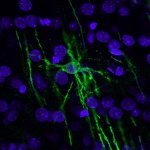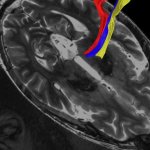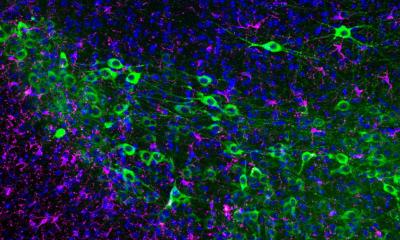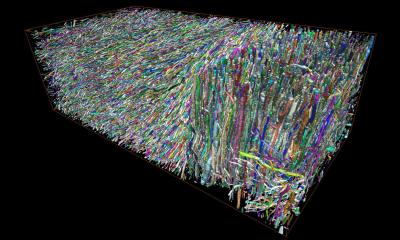News • Origins of the disease(s) explained
Parkinson's: not one, but two diseases?
Although the name may suggest otherwise, Parkinson's disease is not one but two diseases, starting either in the brain or in the intestines.
Which explains why patients with Parkinson’s describe widely differing symptoms, and points towards personalised medicine as the way forward for people with Parkinson's disease. This is the conclusion of a study which has just been published in the leading neurology journal Brain.

Photo: Claus Sjøgren
The researchers behind the study are Professor Per Borghammer and Medical Doctor Jacob Horsager from the Department of Clinical Medicine at Aarhus University and Aarhus University Hospital. "With the help of advanced scanning techniques, we’ve shown that Parkinson's disease can be divided into two variants, which start in different places in the body. For some patients, the disease starts in the intestines and spreads from there to the brain through neural connections. For others, the disease starts in the brain and spreads to the intestines and other organs such as the heart," explains Per Borghammer. He also points out that the discovery could be very significant for the treatment of Parkinson's disease in the future, as this ought to be based on the individual patient's disease pattern.
Scans reveal the starting point of the disease
With this new knowledge, the different symptoms make more sense and this is also the perspective in which future research should be viewed
Per Borghammer
Parkinson’s disease is characterised by slow deterioration of the brain due to accumulated alpha-synuclein, a protein that damages nerve cells. This leads to the slow, stiff movements which many people associate with the disease. In the study, the researchers have used advanced PET and MRI imaging techniques to examine people with Parkinson's disease. People who have not yet been diagnosed but have a high risk of developing the disease are also included in the study. People diagnosed with REM sleep behaviour syndrome have an increased risk of developing Parkinson's disease. The study showed that some patients had damage to the brain's dopamine system before damage in the intestines and heart occurred. In other patients, scans revealed damage to the nervous systems of the intestines and heart before the damage in the brain's dopamine system was visible.
This knowledge is important and it challenges the understanding of Parkinson's disease that has been prevalent until now, says Per Borghammer. "Until now, many people have viewed the disease as relatively homogeneous and defined it based on the classical movement disorders. But at the same time, we’ve been puzzled about why there was such a big difference between patient symptoms. With this new knowledge, the different symptoms make more sense and this is also the perspective in which future research should be viewed,” he says.
Recommended article

News • A look at oligodendrocytes
Parkinson’s disease may start in the gut
Researchers at Karolinska Institutet and the University of North Carolina have mapped out the cell types behind various brain disorders. The findings are published in Nature Genetics and offer a roadmap for the development of new therapies to target neurological and psychiatric disorders.
"Brain-first" or "body-first" determines treatment
The researchers refer to the two types of Parkinson's disease as body-first and brain-first. In the case of body-first, it may be particularly interesting to study the composition of bacteria in the intestines known as the microbiota. "It has long since been demonstrated that Parkinson’s patients have a different microbiome in the intestines than healthy people, without us truly understanding the significance of this. Now that we’re able to identify the two types of Parkinson's disease, we can examine the risk factors and possible genetic factors that may be different for the two types. The next step is to examine whether, for example, body-first Parkinson's disease can be treated by treating the intestines with faeces transplantation or in other ways that affect the microbiome,” says Per Borghammer.
"The discovery of brain-first Parkinson's is a bigger challenge. This variant of the disease is probably relatively symptom-free until the movement disorder symptoms appear and the patient is diagnosed with Parkinson’s. By then the patient has already lost more than half of the dopamine system, and it will therefore be more difficult to find patients early enough to be able to slow the disease," says Per Borghammer.
Recommended article

News • Neuro-Imaging
Advanced MRI scans may improve treatment of Parkinson's disease
Recently developed MRI techniques used to more precisely target a small area in the brain linked to Parkinson's disease and essential tremor may lead to better outcomes without surgery and with less risk of negative effects, a new study led by UT Southwestern researchers suggests.
New knowledge offers hope of better treatment
The study from Aarhus University is longitudinal, i.e. the participants are called in again after three and six years so that all of the examinations and scans can be repeated. According to Per Borghammer, this makes the study the most comprehensive ever, and it provides researchers with valuable knowledge and clarification about Parkinson's disease – or diseases. "Previous studies have indicated that there could be more than one type of Parkinson's, but this has not been demonstrated clearly until this study, which was specifically designed to clarify this question. We now have knowledge that offers hope for better and more targeted treatment of people who are affected by Parkinson's disease in the future," says Per Borghammer.
According to the Danish Parkinson’s Disease Association, there are 8,000 people with Parkinson's disease in Denmark and up to eight million diagnosed patients worldwide. This figure is expected to increase to 15 million in 2050 due to the ageing population, as the risk of getting Parkinson's disease increases dramatically the older the population becomes.
Source: Aarhus University
22.09.2020





